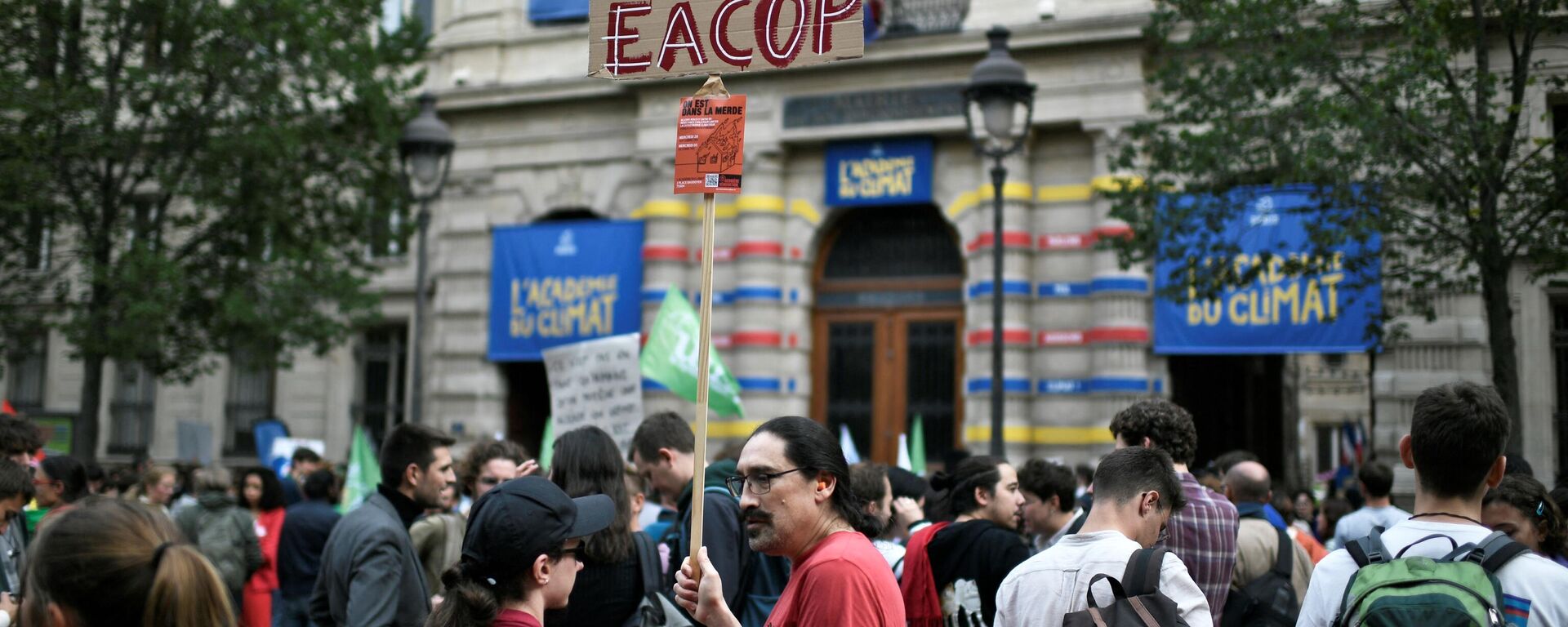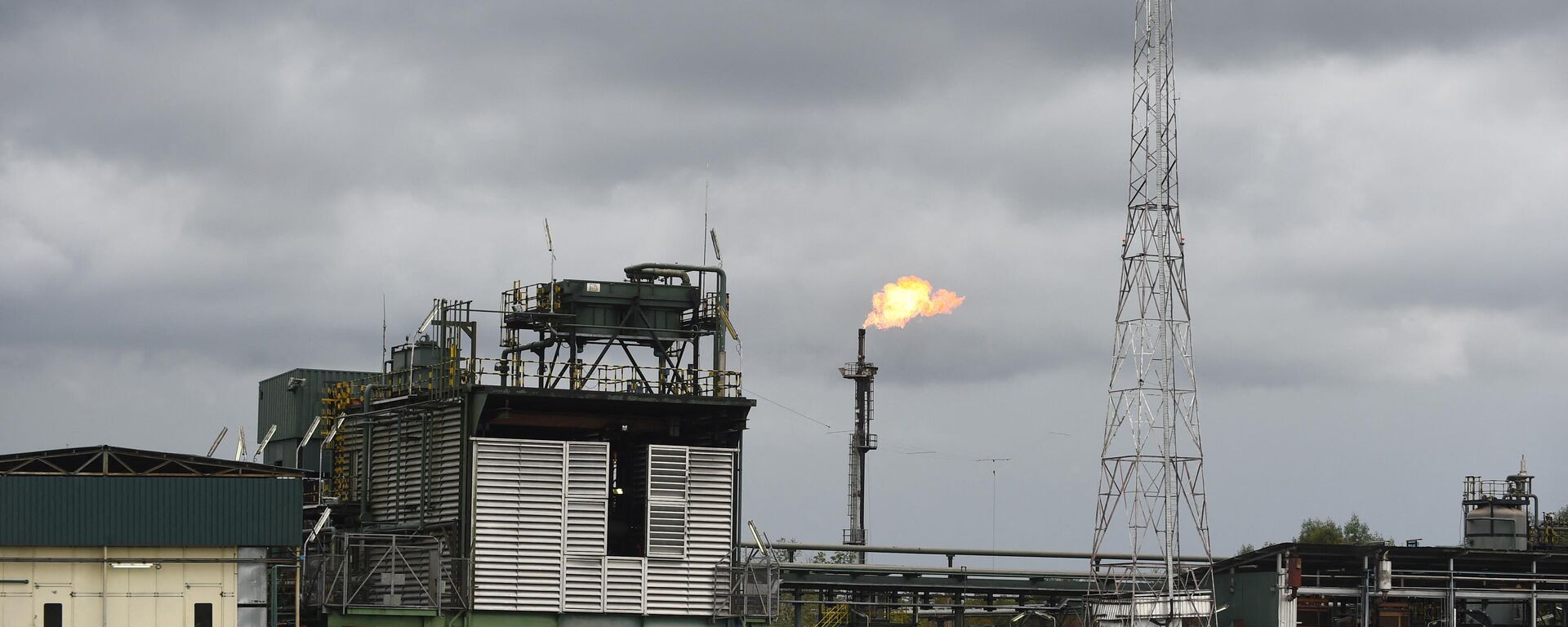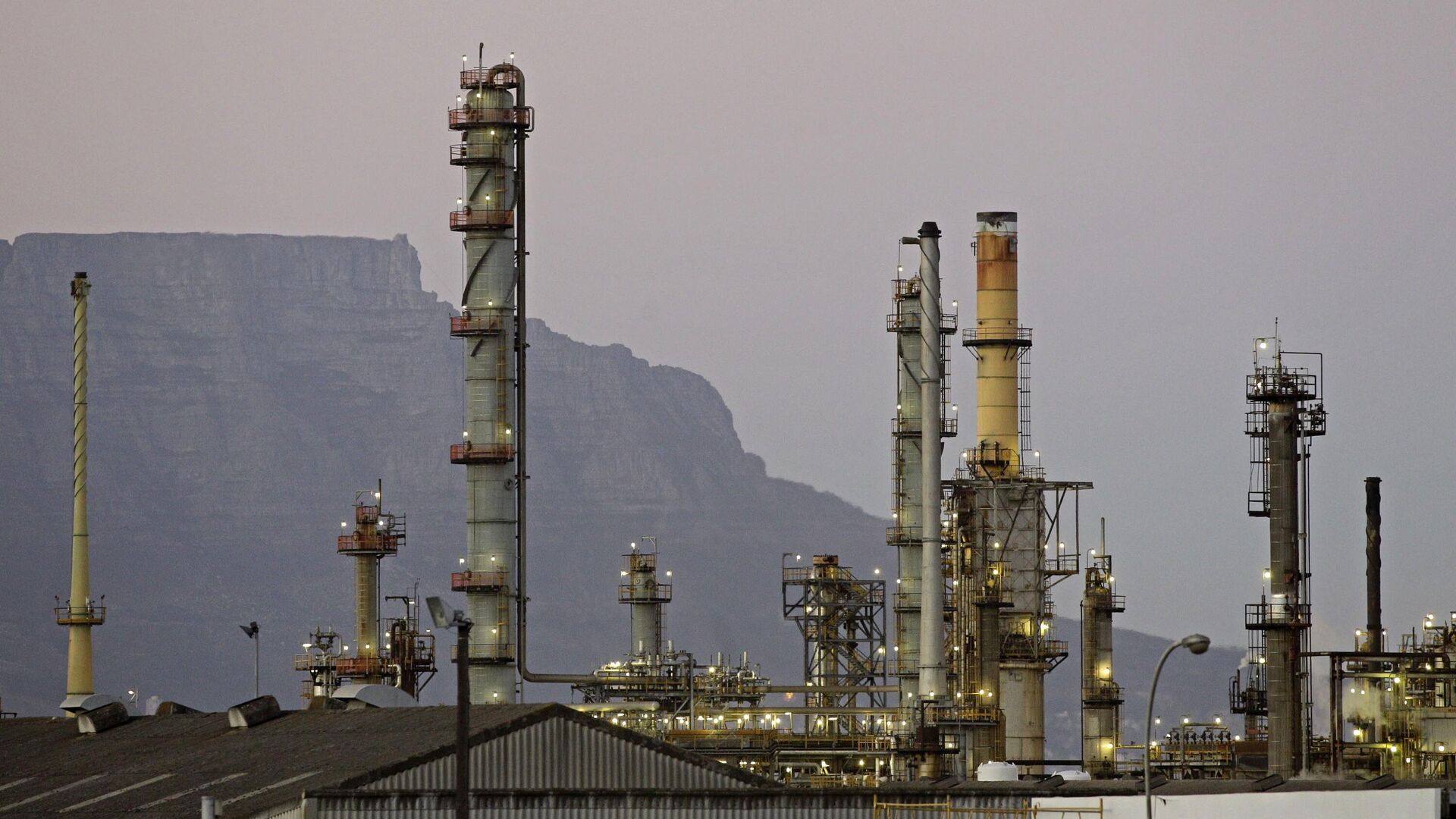https://sputnikglobe.com/20221119/french-totalenergies-to-push-offshore-oil-exploration-in-south-africa-amid-global-energy-crisis-1104431540.html
French TotalEnergies to Push Offshore Oil Exploration in South Africa Amid Global Energy Crisis
French TotalEnergies to Push Offshore Oil Exploration in South Africa Amid Global Energy Crisis
Sputnik International
The article is dedicated to the African nations’ strategies to address energy crisis on the continent, and specifically to the international energy companies’ recent activities in Africa.
2022-11-19T18:45+0000
2022-11-19T18:45+0000
2022-11-23T11:38+0000
africa
south africa
shell oil
oil exploration
oil and gas
fossil fuels
southern africa
https://cdn1.img.sputnikglobe.com/img/07e6/0b/13/1104439898_0:46:3000:1734_1920x0_80_0_0_09a6d17f4b8d5fb483f2995ea7fed51e.jpg
French energy giant TotalEnergies is set to undertake offshore oil exploration activities in the Deep Water Orange Basin (DWOB) off South Africa's west coast, according to SLR Consulting, which has been appointed to conduct an environmental assessment of the proposed project.The consulting agency said that the TotalEnergies EP South Africa is proposing to carry out various exploration activities within the DWOB Licence Block that include seismic surveys. Specifically, the company plans to drill one exploration well and, depending on its success, up to nine additional wells in total. The area of interest for drilling is approximately 9,711 square km in extent and is located between Port Nolloth and Hondeklip Bay off the western part of the country, roughly 188 km from the coast at its closest point. The company as an operator, along with its partners such as Shell, is stepping up its activities following the announcement of the discovery of substantial oil and gas deposits offshore the coast of South Africa and Namibia. At the same time, it highlights its commitment to maintain high standards in terms of environment and safety, recognizing and taking into account all the potential environmental and social impacts of the projects. Earlier this year, South Africa's High Court stopped Shell from conducting seismic surveys in the ecologically sensitive Wild Coast region of the country. The surveys were blocked by coastal communities and various environmental organizations, which insisted that this kind of activity is detrimental to marine life in the area and therefore to marine-dependent communities. In recent years, African countries have turned to fossil fuel-based strategies to ensure energy security, and gain wealth through export revenues. An example of such joint activities would be the East African Crude Oil Pipeline (EACOP), developed by Uganda and Tanzania. The construction of the EACOP pipeline is expected to benefit African countries mainly by developing infrastructure and creating new job opportunities. However, the project, in which French company TotalEnergies is the main stakeholder, owning 62% of the assets, was condemned in an EU resolution for "violating human rights" and "posing social and environmental risks."In response to the EU resolution, Ugandan and Tanzanian officials stated that it represents the "highest level of neocolonialism and imperialism." They highlighted that the delay in the project's realization would only “increase the economic crisis,” and deteriorate the situation on the continent with African countries struggling to lift their people out of poverty. Last week, Mozambique sent its first shipment of liquefied natural gas to the global market. The shipment was headed to Europe and aimed to diversify supplies of natural gas, and ensure the continent's energy security amid the global energy crisis. The shortages in Europe's liquefied natural gas market have primarily been caused by EU sanctions imposed in response to Russia's special military operation in Ukraine. Therefore, European nations, despite their denouncement of fossil fuel development in Africa, have been forced to turn to African reserves.In general, European countries tend to oppose and denounce regional initiatives related to fossil fuel exploration and development, deeming them to be financially and environmentally risky. According to a recent report published by the Carbon Tracker, a further expansion of fossil fuels constitutes a threat to the economic stability of African nations. Instead, the report suggested solar power as a credible alternative to gas and oil in addressing the energy crisis, claiming that investments in renewables are more economically beneficial. However, a Nigerian oil and gas consultant in an exclusive interview with Sputnik expressed an African point of view on the issue, claiming that the report is "politically motivated" and doesn't take into consideration the context in which African countries are trying to solve their regional energy problems.
https://sputnikglobe.com/20220926/french-totalenergies-ceo-summoned-for-questioning-over-companys-participation-in-eacop-reports-say-1101225820.html
https://sputnikglobe.com/20221117/calls-against-african-fossil-fuel-investment-politically-motivated-says-nigerian-expert-1104314815.html
africa
south africa
southern africa
Sputnik International
feedback@sputniknews.com
+74956456601
MIA „Rossiya Segodnya“
2022
News
en_EN
Sputnik International
feedback@sputniknews.com
+74956456601
MIA „Rossiya Segodnya“
Sputnik International
feedback@sputniknews.com
+74956456601
MIA „Rossiya Segodnya“
africa, energy crisis, gas and oil exploration, totalenergies, shell
africa, energy crisis, gas and oil exploration, totalenergies, shell
French TotalEnergies to Push Offshore Oil Exploration in South Africa Amid Global Energy Crisis
18:45 GMT 19.11.2022 (Updated: 11:38 GMT 23.11.2022) International energy companies are increasing their presence in African countries, looking for undiscovered oil and gas in remote regions, despite unprecedented pressure to run down their fossil fuel operations. African nations, in turn, are trying to attract foreign investors, relying on fossil fuel-based approaches to address energy crises.
French energy giant TotalEnergies is set to undertake offshore oil exploration activities in the Deep Water Orange Basin (DWOB) off South Africa's west coast,
according to SLR Consulting, which has been appointed to conduct an environmental assessment of the proposed project.
The consulting agency said that the TotalEnergies EP South Africa is proposing to carry out various exploration activities within the DWOB Licence Block that include seismic surveys. Specifically, the company plans to drill one exploration well and, depending on its success, up to nine additional wells in total.
The area of interest for drilling is approximately 9,711 square km in extent and is located between Port Nolloth and Hondeklip Bay off the western part of the country, roughly 188 km from the coast at its closest point.
The company as an operator, along with its partners such as Shell, is stepping up its activities following the announcement of the discovery of substantial oil and gas deposits offshore the coast of South Africa and Namibia. At the same time, it
highlights its commitment to maintain high standards in terms of environment and safety, recognizing and taking into account all the potential environmental and social impacts of the projects.
Earlier this year, South Africa's High Court stopped Shell from conducting seismic surveys in the ecologically sensitive Wild Coast region of the country. The surveys were blocked by coastal communities and various environmental organizations, which insisted that this kind of activity is detrimental to marine life in the area and therefore to marine-dependent communities.
In recent years, African countries have turned to fossil fuel-based strategies to ensure energy security, and gain wealth through export revenues. An example of such joint activities would be the East African Crude Oil Pipeline (EACOP), developed by Uganda and Tanzania. The construction of the EACOP pipeline is expected to benefit African countries mainly by developing infrastructure and creating new job opportunities.
However, the project, in which French company TotalEnergies is the main stakeholder, owning 62% of the assets, was
condemned in an EU resolution for "violating human rights" and "posing social and environmental risks."

26 September 2022, 13:11 GMT
In response to the EU resolution, Ugandan and Tanzanian officials stated that it represents the "highest level of neocolonialism and imperialism." They highlighted that the delay in the project's realization would only “increase the economic crisis,” and deteriorate the situation on the continent with African countries struggling to lift their people out of poverty.
Last week, Mozambique
sent its first shipment of liquefied natural gas to the global market. The shipment was headed to Europe and aimed to diversify supplies of natural gas, and ensure the continent's energy security amid the global energy crisis. The
shortages in Europe's liquefied natural gas market have primarily been caused by EU sanctions imposed in response to Russia's special military operation in
Ukraine. Therefore, European nations, despite their denouncement of fossil fuel development in Africa, have been forced to turn to African reserves.
In general, European countries tend to oppose and denounce regional initiatives related to fossil fuel exploration and development, deeming them to be financially and environmentally risky. According to a recent report published by the Carbon Tracker, a further expansion of fossil fuels constitutes a threat to the economic stability of African nations. Instead, the report suggested solar power as a credible alternative to gas and oil in addressing the energy crisis, claiming that investments in renewables are more economically beneficial.
However, a Nigerian oil and gas consultant in an
exclusive interview with Sputnik expressed an African point of view on the issue, claiming that the report is "politically motivated" and doesn't take into consideration the context in which African countries are trying to solve their regional energy problems.

17 November 2022, 10:59 GMT




